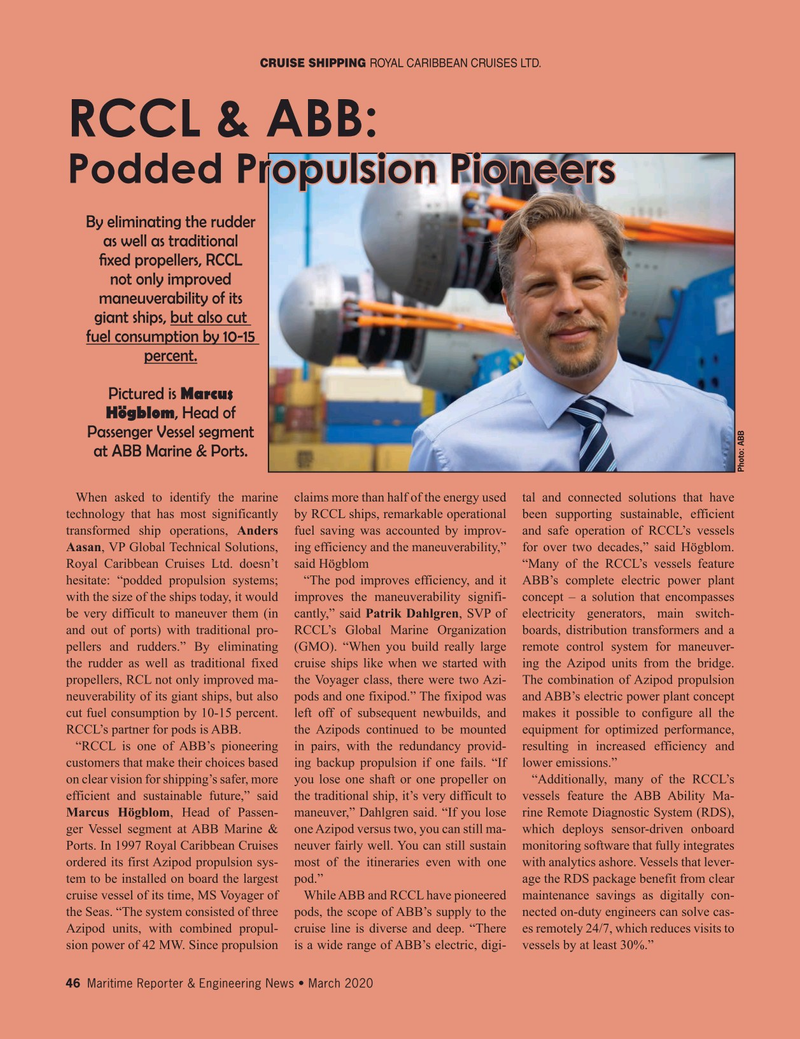
Page 46: of Maritime Reporter Magazine (March 2020)
Cruise Shipping Annual
Read this page in Pdf, Flash or Html5 edition of March 2020 Maritime Reporter Magazine
CRUISE SHIPPING ROYAL CARIBBEAN CRUISES LTD.
RCCL & ABB:
Podded Propulsion Pioneers
By eliminating the rudder as well as traditional ? xed propellers, RCCL not only improved maneuverability of its giant ships, but also cut fuel consumption by 10-15 percent.
Pictured is Marcus
Högblom, Head of
Passenger Vessel segment at ABB Marine & Ports.
Photo: ABB
When asked to identify the marine claims more than half of the energy used tal and connected solutions that have technology that has most significantly by RCCL ships, remarkable operational been supporting sustainable, efficient transformed ship operations, Anders fuel saving was accounted by improv- and safe operation of RCCL’s vessels
Aasan, VP Global Technical Solutions, ing efficiency and the maneuverability,” for over two decades,” said Högblom.
Royal Caribbean Cruises Ltd. doesn’t said Högblom “Many of the RCCL’s vessels feature hesitate: “podded propulsion systems; “The pod improves efficiency, and it ABB’s complete electric power plant with the size of the ships today, it would improves the maneuverability signifi- concept – a solution that encompasses be very difficult to maneuver them (in cantly,” said Patrik Dahlgren, SVP of electricity generators, main switch- and out of ports) with traditional pro- RCCL’s Global Marine Organization boards, distribution transformers and a pellers and rudders.” By eliminating (GMO). “When you build really large remote control system for maneuver- the rudder as well as traditional fixed cruise ships like when we started with ing the Azipod units from the bridge. propellers, RCL not only improved ma- the Voyager class, there were two Azi- The combination of Azipod propulsion neuverability of its giant ships, but also pods and one fixipod.” The fixipod was and ABB’s electric power plant concept cut fuel consumption by 10-15 percent. left off of subsequent newbuilds, and makes it possible to configure all the
RCCL’s partner for pods is ABB. the Azipods continued to be mounted equipment for optimized performance, “RCCL is one of ABB’s pioneering in pairs, with the redundancy provid- resulting in increased efficiency and customers that make their choices based ing backup propulsion if one fails. “If lower emissions.” on clear vision for shipping’s safer, more you lose one shaft or one propeller on “Additionally, many of the RCCL’s efficient and sustainable future,” said the traditional ship, it’s very difficult to vessels feature the ABB Ability Ma-
Marcus Högblom, Head of Passen- maneuver,” Dahlgren said. “If you lose rine Remote Diagnostic System (RDS), ger Vessel segment at ABB Marine & one Azipod versus two, you can still ma- which deploys sensor-driven onboard
Ports. In 1997 Royal Caribbean Cruises neuver fairly well. You can still sustain monitoring software that fully integrates ordered its first Azipod propulsion sys- most of the itineraries even with one with analytics ashore. Vessels that lever- tem to be installed on board the largest pod.” age the RDS package benefit from clear cruise vessel of its time, MS Voyager of While ABB and RCCL have pioneered maintenance savings as digitally con- the Seas. “The system consisted of three pods, the scope of ABB’s supply to the nected on-duty engineers can solve cas-
Azipod units, with combined propul- cruise line is diverse and deep. “There es remotely 24/7, which reduces visits to sion power of 42 MW. Since propulsion is a wide range of ABB’s electric, digi- vessels by at least 30%.” 46 Maritime Reporter & Engineering News • March 2020
MR #3 (34-49).indd 46 3/6/2020 2:23:46 PM

 45
45

 47
47
